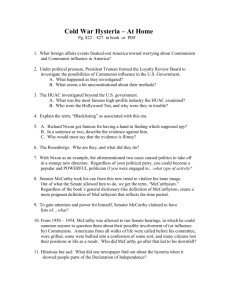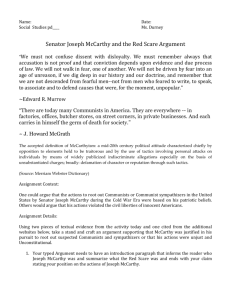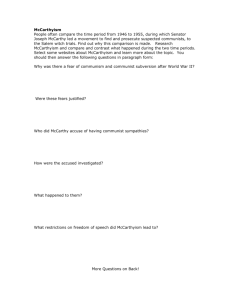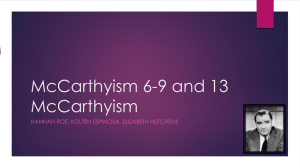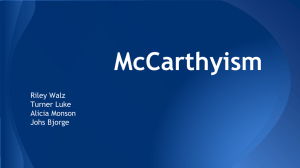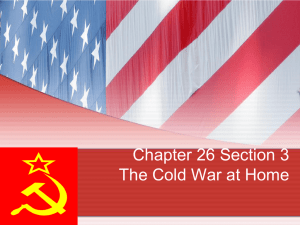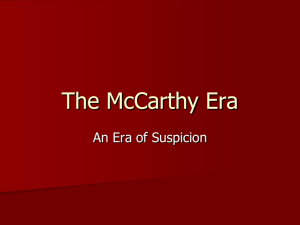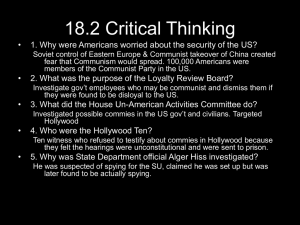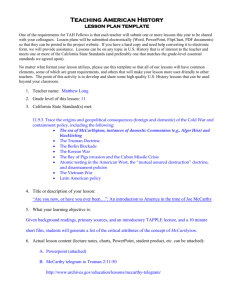SIOP Lesson Plan
advertisement
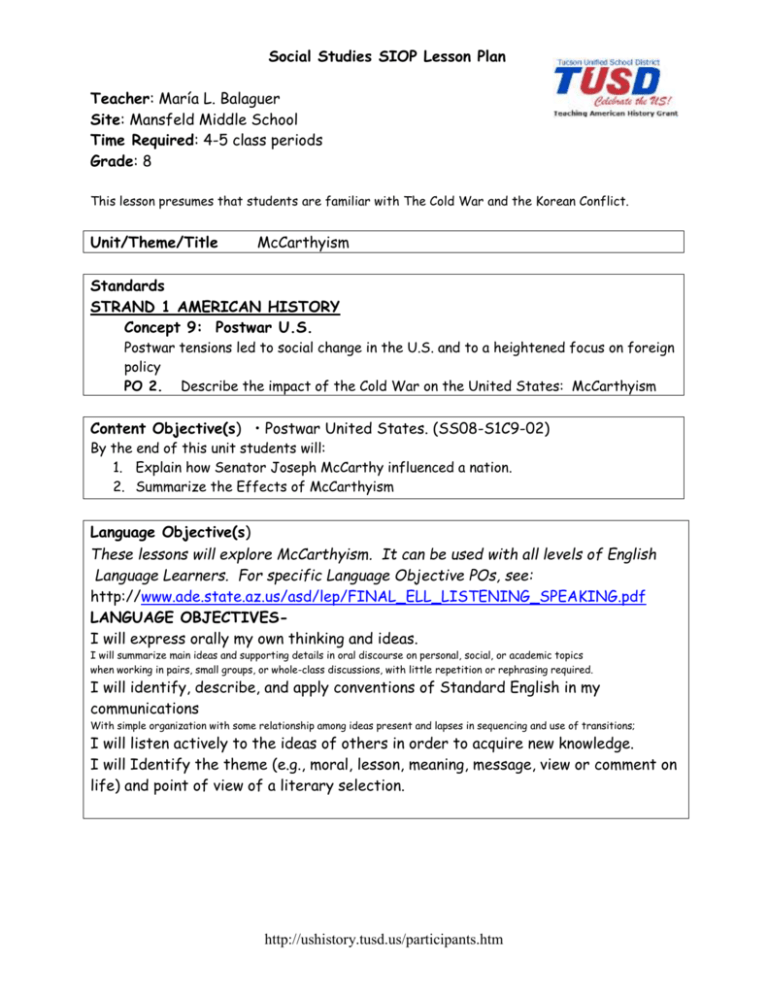
Social Studies SIOP Lesson Plan Teacher: María L. Balaguer Site: Mansfeld Middle School Time Required: 4-5 class periods Grade: 8 This lesson presumes that students are familiar with The Cold War and the Korean Conflict. Unit/Theme/Title McCarthyism Standards STRAND 1 AMERICAN HISTORY Concept 9: Postwar U.S. Postwar tensions led to social change in the U.S. and to a heightened focus on foreign policy PO 2. Describe the impact of the Cold War on the United States: McCarthyism Content Objective(s) • Postwar United States. (SS08-S1C9-02) By the end of this unit students will: 1. Explain how Senator Joseph McCarthy influenced a nation. 2. Summarize the Effects of McCarthyism Language Objective(s) These lessons will explore McCarthyism. It can be used with all levels of English Language Learners. For specific Language Objective POs, see: http://www.ade.state.az.us/asd/lep/FINAL_ELL_LISTENING_SPEAKING.pdf LANGUAGE OBJECTIVESI will express orally my own thinking and ideas. I will summarize main ideas and supporting details in oral discourse on personal, social, or academic topics when working in pairs, small groups, or whole-class discussions, with little repetition or rephrasing required. I will identify, describe, and apply conventions of Standard English in my communications With simple organization with some relationship among ideas present and lapses in sequencing and use of transitions; I will listen actively to the ideas of others in order to acquire new knowledge. I will Identify the theme (e.g., moral, lesson, meaning, message, view or comment on life) and point of view of a literary selection. http://ushistory.tusd.us/participants.htm KEY VOCABULARY allege blacklist censure Civil Rights Cold war Communist Congressional hearing subversion Iron Curtain perjury Red Scare Propaganda Loyalty oaths stereotype Name-calling Left-wing ideologist Witch-hunt The Left MATERIALS o Index cards cut in half –one for each student (2-3 with a red dot) o Vocabulary fill-in assignment o Biography Joseph McCarthy o After war summary o Vocabulary match game TECHNOLOGY INTEGRATION/WEB SITES http://www.loc.gov/rr/print/swann/herblock/fire.html for Herb Block political cartoons PREPARATION DAY: 1- For day one see ‘lesson sequence’ 2- Have students generate a list of things they think are “UN-AMERICAN”. Guide them with reminding them what the Bill of Rights allows us. (Free speech, no gun ownership, etc.) 3- Hand students an index card with either a vocabulary word or a definition when they walk in. Their partner will be the person who corresponds with their vocabulary word. 4- Students will go directly to work with their partners 5- Set up classroom as a studio with an audience. http://ushistory.tusd.us/participants.htm LESSON SEQUENCE DAY 1: This is an extended lesson preparation: 1. Students will participate in a simulation called the “Dot-Game” adapted from a TCI Activity. The purpose is for the students to experience some of the suspicions associated with the McCarthy Era. o o o o o o o o o o o Inform students that they will be transported back to 1949, to a time of suspicion of neighbors, friends and co-workers. They are going to be everyday people in 1949; however, amongst them there are spies for the enemy! There is safety in numbers. Their goal is to form the largest group of ‘friends’ without allowing someone they suspect to be a communist to join them. Some of them will have a card with a red dot on it, but they must not share this information with anyone. They are the SPIES. Everyone may ask questions and they may be asked questions, but it is their call as to whether they tell the truth or believe the speaker. (Remember, the person you are speaking to might be a spy!) Have students pick a card. They are not to reveal what is on their card to anyone else. THIS IS TOP SECRET!! Some of the cards have a red dot on them while most of the cards are blank. The goal is for the students to create the largest group possible without any red dots. The largest group without a member with a red dot wins. Any person who holds a red dot and has infiltrated a group wins. 2. The activity should take 15 minutes but be flexible with the time. Bring students back and ask: How did they know whom to stand with? At any time were they absolutely positive about their decision? Did they have doubts about their friends in class? Did they change their minds at any point? If they did change, what made them change? 3. After the discussion, explain that there was a man named Joseph McCarthy who did just that to America. 4. He accused people of communism and set off a wave of hysteria across our country. 5. At this point you will review the vocabulary with the students. 6. Hand the sheet with the definitions out and have students write the words in from the discussion. You should have the list on an overhead for students to copy and write correctly. http://ushistory.tusd.us/participants.htm DAY 2: 1. Review the things that students believe are “un-American”. (answers will vary) 2. Hand students a copy of “After the war summary”. (you should have a class set made) 3. Read out loud as a class while asking questions and reviewing facts. 4. Ask students to notice the underlined words. These are their vocabulary words. 5. After reading, have students take out their vocabulary from the previous day. 6. Have students locate the words in the reading and read the sentence it appears in. 7. Students are to write the sentence on the back of their vocabulary fill-in. 8. Tell students to study their words tonight; there will be an activity tomorrow. DAY 3 & 4: 1. Hand students an index card with either a vocabulary word or a definition when they walk in. 2. Their partner will be the person who corresponds with their vocabulary word. 3. Explain to students that television had not yet reached all households in the country and that the radio, newspaper and word of mouth was still how many people got their news. 4. They will be working in groups to create a radio broadcast biography of Senator McCarthy. 5. Review and discuss how a biography tells of a person’s life and times. 6. Divide the class in half (making sure that partners are in the same half). 7. GROUP 1: The first half of the class will be working on a Radio Broadcast. (2 students per topic) 8. Hand each person in group one the ‘broadcast handout’. They will begin reading while you work with the next group. 9. GROUP 2: The second half of the class will be working on a newspaper. Each pair will be responsible for one page of the newspaper. 10. Hand each person in group 2 a copy of the ‘beginning reporting’’ handout. They are to read their handout. 11. Each pair will have a specific part of the senator’s life to report on. If you find that you would like to divide the topics differently, please feel free. -Early life -1929-1939 -Circuit Judge -Military Career -1945-1953 -Army/McCarthy Hearings -Last years 12. Hand out the Biography of Joseph McCarthy 13. Students should read the entire biography before beginning to work on their own section. http://ushistory.tusd.us/participants.htm 14. Students will have the rest of this period and tomorrow to prepare their skits. DAY 5: 1. Presentation of skits Application/Practice DAY 1- Get in a group by asking questions and trying to decipher fact from fiction. Introduction to vocabulary 2- Guided and Independent reading practice--summarizing and presentation of material. 3/4- Preparing skits/interviews 5- Presentation of skits Review/Assessment DAY 1- Walk around room, ensuring that students have copied correct words with definition. 2Have students locate the words in the reading and read the sentence it appears in. Students are to write the sentence on the back of their vocabulary fill-in. 3/4 Broadcasts and interviews. 5- Skits should be performed with ease and not reading verbatim from notes. Reflections These are time consuming lessons, however, it would be difficult to speak of McCarthyism and its impact without having so much investigation. Much more can be done with Herb Block’s political cartoons (I’ve included the link). http://ushistory.tusd.us/participants.htm
